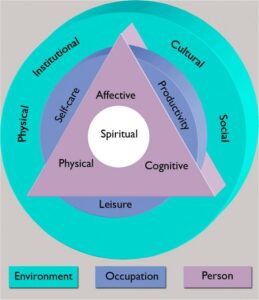CONSIDERATIONS FOR OCCUPATIONAL THERAPY INPUT IN ADDRESSING HOUSING NEEDS
Charlotte Fox is an Independent Occupational Therapist and Partner at Occupational Therapy Norfolk. Charlotte specialises in housing and neurology, and has built up extensive experience across Health, Social and the Private Sector. She is also a Regional Representative for the College of Occupational Therapist’s Specialist Section Independent Practice. Charlotte’s caseload includes clients undergoing rehousing, adaptations, and rehabilitation; often following life changing injuries including brain, spine and orthopaedic injuries. She is passionate about providing a truly client focused, holistic service that advocates for each individual’s needs, and the specific (and often individualised or creative) interventions required to help them achieve their potential.
Who?
When selecting an Occupational Therapist (OT) to support a client with their housing needs there are several factors to consider but the two main one’s are fairly obvious:
- Does the OT have experience in working with clients with this condition / disability / health issue?
- Does the OT have experience in working with adaptations of the budget / scope / size anticipated for this project?
Easy questions to ask, but it’s important to make sure you really get a feel and reassurance that you have the right OT for your client’s needs.
What?
What are you expecting from the OT? What should you expect?
A suitably experienced Occupational Therapist will have skills in undertaking a thorough and truly holistic assessment of an individual’s functioning including their abilities and their difficulties. They should be able to explore the full range of options to enable an individual to function as effectively as possible, offer opinion on ideal solutions, and work to overcome situations where the ideal may not be achievable (where funds are limited, accommodation limited, client choice dictates otherwise, or other factors complicate achieving the “ideal” solution.) This can on sometimes be done through a one-off assessment, but for more complex situations the knowledge of an individual’s requirements comes through addressing their other rehabilitative needs, and as a result requires a more robust therapeutic relationship to know and understand the minutiae of a situation.
An example of how an OT considers individual functioning in terms of their environment is shown in the below Canadian Model of Occupational Performance and Engagement Model (www.thecopm.ca) – one of many model’s OT’s may use to structure their practice.. Each aspect below has the potential to influence what the final solution to an individual’s housing needs are. It goes far beyond just the physical needs.
Occupational Therapists work with people addressing a range of rehabilitative needs; this may be through remedial, or compensatory approaches – more often than not a careful assimilation of both approaches is required. But it’s not hard to appreciate that the environment an individual lives in is crucial to maximising their functioning.
An OT’s role might range from a one-off assessment giving simple recommendations for items of equipment, through to supporting a client to engage in the process of finding accomodation, designing adaptations, trialling a range of specialist items of equipment in order to identify what needs to be installed in a property, and addressing their wider rehabilitation needs.
When it has been identified that an individual needs adaptation to an existing property, or requires rehousing (either rental or a purchase), individuals may be at the physical and practical point of addressing their needs, but may not be anywhere near ready in terms of their psychological or emotional state to engage or participate effectively in a move.
An OT’s role in addressing the housing needs for an individual includes the usual aspects of specifying specialist items of equipment, but is often be much broader than this and may include:
- Clinical analysis of their current physical, cognitive and emotional functioning which may identify a range of issues (e.g acceptance of disability, motivation and engagement in tasks), which may need addressing to enable a successful property search to be conducted and subsequent planning of suitable adaptations.
- Risk assessment and management. Where client opinion and “expert” opinions differ, or where limitations in achieving the “ideal” arise an OT can be crucial in identifying and working with clients to formulate, and clinically justify the final solution.
- Utilising the process of the housing adaptation as an effective therapeutic intervention in terms of engaging in meaningful activity, accessing the community, organisation skills, and progressing towards acceptance of disability.
When?
The point at which an OT receives referrals for involvement in a client’s housing needs can vary significantly. Understandably external factors can influence this. But the point at which an OT is involved can impact significantly in the overall development of a housing project.
The process of engaging in a housing adaptation is intensive and the demands on the client have to be carefully managed; a skilled Occupational Therapist will be able to monitor the impact of this on a client, and potentially utilise the process to assist in their wider rehabilitation.
Consider involvement sooner rather than later. Expert Witness reports are obviously crucial in addressing quantum and the likely way forward in terms of rehabilitation and meeting needs, but again most people are complex individuals and an “on the ground therapist” who works closely alongside a client can be crucial in unpicking and identifying key factors that are vital to a client’s current and future functioning. Ensure an OT is on board from an appropriate point and is offered the opportunity to begin building a therapeutic relationship – don’t wait until the property is found, and the plans are drawn as so much of an opportunity has already been missed.
Where?
The College of Occupational Therapist’s Specialist Section for Independent Practice has an online directory where you can search for Independent Occupational Therapist by Specialism and/or location.
http://www.cotss-ip.org.uk/find/
Or you could try contacting the Regional Rep’s for the area you need an OT covered.
Word of mouth, and asking around can be vital too.
Statutory services may also offer input. Across the country OT services vary; some are integrated fully between NHS and Social Care, other’s offer OT’s situated directing in Local Authority Housing Teams, and other’s via Social Care or NHS separately.
Wherever you source OT input from, the questions around experience for your particular client always need to be asked.
Why?
I love watching Phil and Kirsty on “Location, location, location”, and secretly scoffing at the clients with their 300 point checklists, who are unwilling to compromise on anything to achieve their dream home.
In reality I know I will probably end up living in my house for the rest of my life; because the chances of me finding a property that would incentivise me to leave my current one are pretty slim. We bought a bungalow (well I am an OT!) so have some reassurance that we could probably cope should something untoward occur. But that doesn’t mean our house is perfect for us; it’s too small, it’s not detached – and I have noisy children, and I would love a field nearby to walk the dog on. But despite these failing’s it’s our home and somehow it still works for our family as we need it to… and by doing so it makes us happy and efficient.
But what’s my point….? Something may not be ideal, or what we would expect. There might be hurdles to overcome, and tough decisions to make, and we may have to make comprises – sometimes these compromises are necessary or just right for us as individuals. But over the years of working as an Occupational Therapists with individuals who may have housing needs alongside other issues, I find myself feeling more strongly than ever that understanding and treating the individual as a whole is vital to enabling a housing adaptation to be successful.
In reality each person’s disability needs are deeply entwined with their whole identity, and that’s what Occupational Therapy is truly about: Treating clients holistically with the aim of improving overall functioning in life as a key focus.
It may mean having to face up to some tough realities that people (and properties) don’t fit into boxes, and individuals living with disability don’t always want, or can’t always access “what’s best” or “theoretically right”, but in order to provide a housing solution that doesn’t just tick the boxes, and instead truly facilitates an individual’s recovery and long term rehabilitation and functioning, having the right OT on board can make all the difference.




